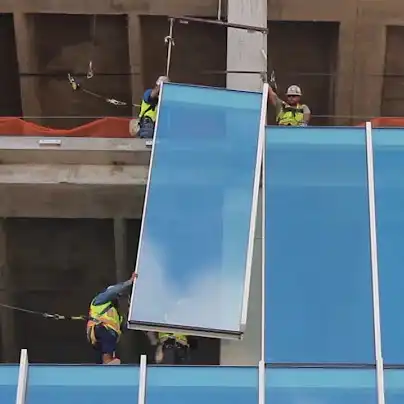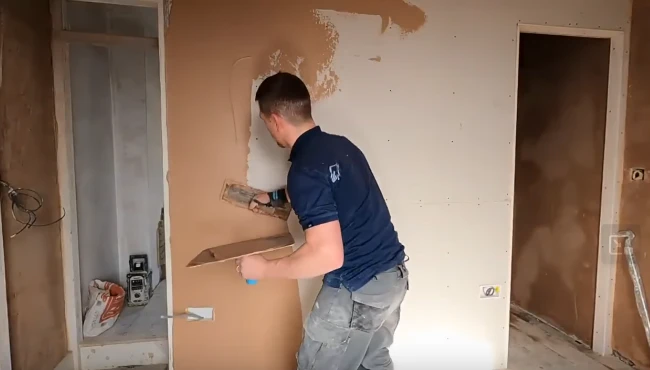What does a curtain wall installer do?
Curtain wall installers are skilled professionals who are responsible for installing the stunning glass facades of modern buildings, known as curtain walling. These systems, usually made of glass and aluminum, are non-structural and are designed to improve the aesthetics, energy efficiency and functionality of a building. As a curtain wall installer, you will be responsible for the precise assembly and installation of these systems on various structures.
Required skills
To excel in this role, a curtain wall installer needs a combination of technical skills. Key skills include proficiency in using hand and power tools. Attention to detail, precision and the ability to interpret technical drawings are paramount. Physical fitness is essential as the work involves lifting and positioning large panes of glass. In addition, problem solving skills in overcoming installation challenges are an asset.

Qualifications
Obtaining the National Vocational Qualification (NVQ) Level 2 and/or NVQ Level 3 in Curtain Wall Installation is highly recommended. These qualifications demonstrate a solid foundation of theoretical knowledge and hands-on skills. Holding a blue CSCS card or gold CSCS card is equally important, as it signifies competence and adherence to health and safety standards on construction sites.
Benefits
Becoming a certified curtain wall installer opens doors to numerous benefits. The blue CCSCS card and gold CSCS card not only enhances employability but also increases the likelihood of securing higher-paying positions. Additionally, it provides access to ongoing training opportunities, keeping you updated with the latest industry advancements.
Challenges
While the profession is rewarding, it comes with its challenges. Working at heights and dealing with large, heavy panels can be physically demanding. Achieving perfection in the installation process may be time-consuming, demanding patience and persistence. However, adaptability and a keen attention to detail are essential to navigate these challenges successfully.
Career path and progression
The career path for curtain wall installers is promising. Starting as an apprentice, you can progress to an installer mate, then to a lead installer role. With experience, you may move into supervisory or managerial positions. The industry values a combination of hands-on experience and continuous learning, providing ample opportunities for advancement.
Statistics
Curtain wall installers and glaziers in the UK* – Prognosis
Average Annual Increase
ARR**
SOURCE: CITB ” Labour Market Intelligence Report (2024 – 2028)”.
* These prognosis calculations assume constant ARR and growth rate without significant external disruptions.
** ARR – Annual Recruitment Requirement is a metric used to estimate the number of new workers needed annually to meet labour market demands in a specific industry, region, or occupation.
How much could you earn as a curtain wall installer
Curtain wall installers in the UK earn varying wages based on experience and employment status. Entry-level employed workers earn around £16.50 per hour (£30,600 annually), while experienced ones can earn up to £22 per hour (£48,000 annually). Self-employed individuals charge approximately £18 per hour, with daily earnings ranging from £144 to £200, depending on experience and location.
*Information sourced from reputable recruitment sites and agencies, reflecting the latest job market insights and trends. Figures can vary based on factors such as specific job requirements, individual qualifications, and regional economic conditions. Additionally, self-employed professionals should account for expenses such as tools, materials, insurance, and transportation when calculating their net earnings.
Typical hours per week
Standard work hours per week
(Employed)
Working hours per week with overtime
(Employed and Self-employed)
Curtain wall installers typically work standard full-time hours, averaging 40 to 45 hours per week. However, project demands may sometimes require additional hours, especially when deadlines are approaching. The dynamic nature of the construction industry ensures that no two weeks are exactly alike.
Conclusion
Being a curtain wall installer in the UK is not just a job; it’s a dynamic and rewarding career. From the thrill of seeing a building’s exterior come to life to the satisfaction of overcoming challenges, this profession offers a unique blend of skills and experiences. So, if you’re ready for a career that blends craftsmanship with innovation, curtain wall installation might be your perfect fit.

